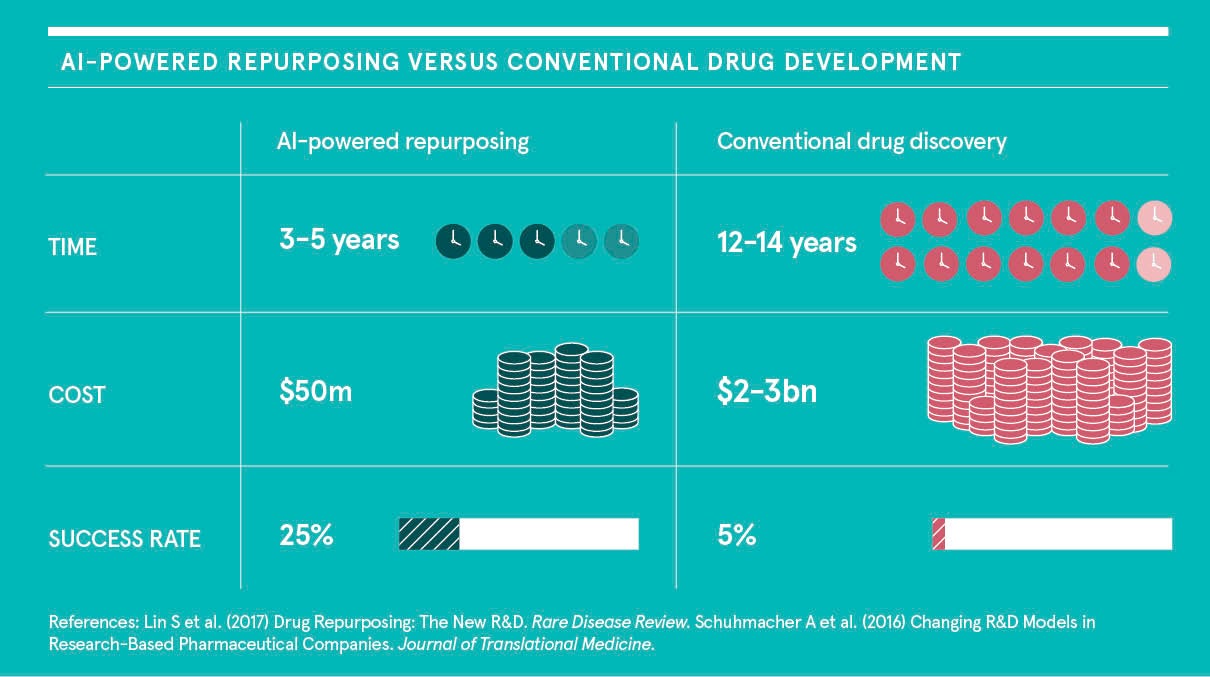Astute and targeted use of artificial intelligence (AI), combined with pharmacological expertise and patient group insight, is transforming drug discovery from an expensive and uncertain expedition to a manageable challenge.
To the 350 million people in the world living with a rare disease, 95 per cent of whom don’t have an approved treatment, the pioneering application of science and technology from Cambridge-based drug discovery company Healx offers a paradigm shift.
The company, which uses data, AI and expert pharmacology to repurpose existing drugs, allows novel treatments to be developed at a fraction of the cost and average time of traditional drug development.
Healx’s AI platform provides new hope for a global cohort of patients living with 7,000 different rare diseases
The pharmaceutical industry is reticent about targeting rare diseases because of the often-ruinous developmental metrics, but Healx has proved that its system – interrogating millions of datapoints from gene expression signatures to patient responses – offers a dynamic alternative.
The speed and accuracy of its Healnet AI platform provides new hope for a global cohort of patients living with 7,000 different rare diseases as the company scales up to advance 100 treatments towards the clinic by 2025.
“The cost and risk of failure of the big pharma approach means patients with rare diseases are poorly served,” says Dr Tim Guilliams, who founded the company in 2014 with Dr David Brown, co-inventor of the blockbuster Viagra drug.
“We combine the power of AI with scientific knowledge to examine data from thousands of existing drugs to discover relevant connections that could benefit other diseases. We collaborate with patient groups and use every piece of information out there to find cures for these patients. It’s about using existing knowledge to predict new knowledge.”
Healx’s AI engineers have built the most comprehensive knowledge graph of rare disease information, comprising data from a host of sources such as scientific literature, clinical trials and proprietary data.
A suite of complex algorithms is deployed to pinpoint relationships between drugs and diseases that have the potential to deliver therapeutic benefit. This is layered with critical oversight delivered by a multi-disciplinary team of rare disease experts, patient advocates and drug discovery scientists.
This rich matrix of intelligence predicts new treatments, around 80 per cent faster and 90 per cent cheaper, than traditional research and development, and can reach the patient in three to five years. It’s a world away from the average concept-to-drug timescale of 12 to 14 years and its £2-billion to £3-billion price tag.
“Our platform uses the most advanced technology available with the sharpest scientific insights,” says Dr Guilliams, the company’s chief executive. “Yet our collaboration with patient groups is also hugely important as we have to understand their challenges and needs to best work towards finding effective treatments.”
Its success with fragile X syndrome – the most common genetic cause of autism and learning disabilities, which still has no effective treatments despite decades of research – is concrete evidence of efficacy. Healx identified eight candidate drugs for repurposing within six months and the most promising of these drugs are now progressing to phase-2a clinical trials.
Healx collaborated closely with the FRAXA Research Foundation, which is pursuing cures for the condition which affects one in 4,000 males and one in 8,000 females. Dr Michael Tranfaglia, FRAXA’s medical director, says: “Healx has energised the search for new rare disease treatments and their technology is exciting for everyone in the field, particularly the patients.”
The team at Healx is working on a number of rare diseases with a plan to expand the portfolio ten-fold over the next five years, backed by recent £7.6-million series-A funding to scale up its operations. Dr Guilliams sums up the company’s ethos: “Healx has a simple but profound goal: to transform the lives of rare disease patients. Our technology helps us to find treatments where none currently exist.”
For more information please visit www.healx.io



